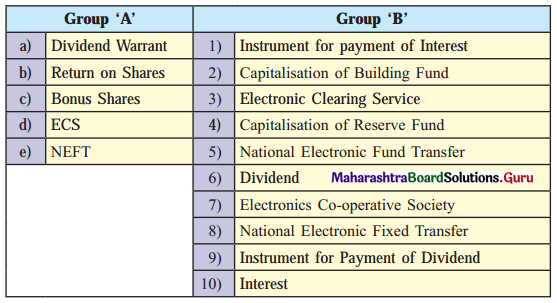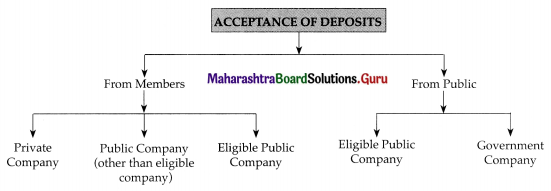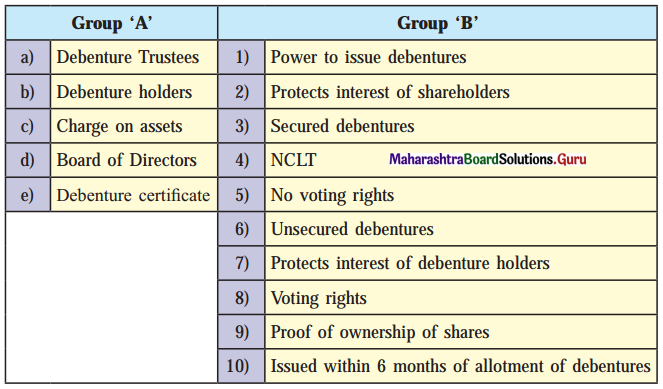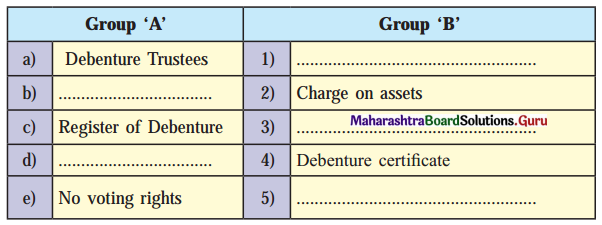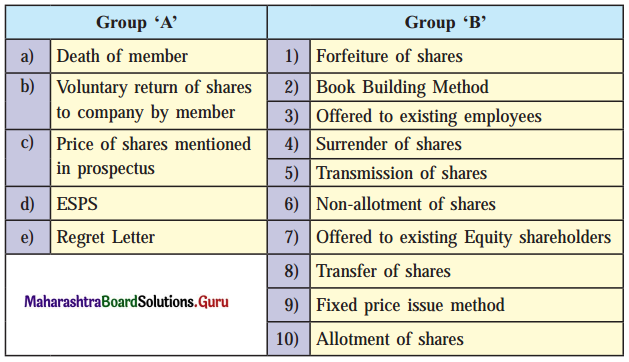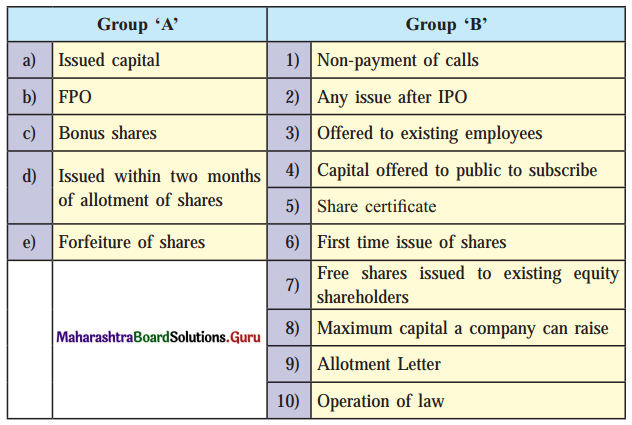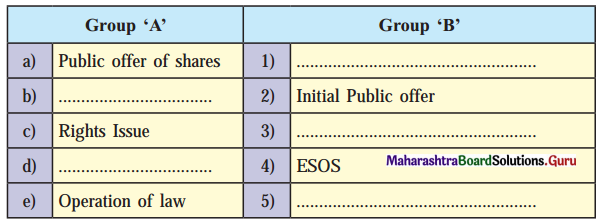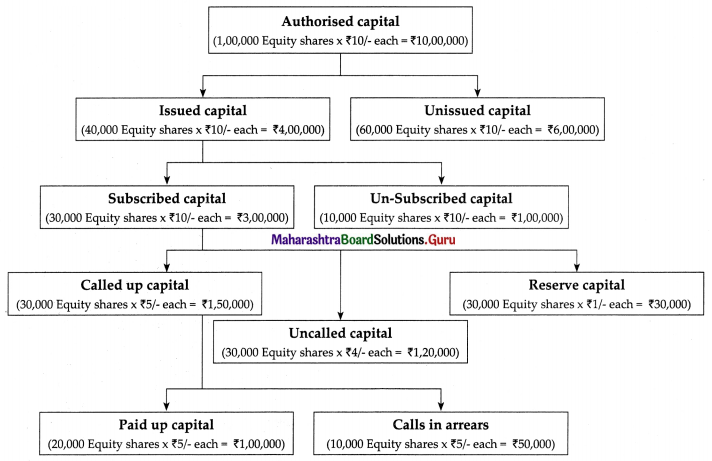Balbharti Maharashtra State Board Class 12 Secretarial Practice Solutions Chapter 12 Stock Exchange Textbook Exercise Questions and Answers.
Maharashtra State Board Class 12 Secretarial Practice Solutions Chapter 12 Stock Exchange
1A. Select the correct answer from the options given below and rewrite the statements.
Question 1.
A stock exchange is where stock brokers and traders can buy and sell ______________
(a) Gold
(b) Securities
(c) Goods
Answer:
(b) Securities
![]()
Question 2.
The ______________ is the first Stock Exchange to be recognized by the Indian Government under the Securities Contracts (Regulation) Act.
(a) BSE
(b) NSE
(c) OTCEI
Answer:
(a) BSE
Question 3.
______________ is a dealer in Stock Exchange who carries on trading of securities in his own name.
(a) Jobber
(b) Broker
(c) Bull
Answer:
(a) Jobber
Question 4.
A ______________ who expects fall in price of securities.
(a) bull
(b) bear
(c) Jobber
Answer:
(b) bear
![]()
Question 5.
The practice of buying and selling within the same trading day before the close of the market on that day is called ______________
(а) insider trading
(b) day trading
(c) auction
Answer:
(b) day trading
1B. Match the pairs.
Question 1.
| Group ‘A’ | Group ‘B’ |
| (a) SEBI | (1) Expects the price of shares to rise in the future. |
| (b) Day Trading | (2) Expects the price of shares to fall in the future. |
| (c) Bull | (3) Buying and selling of securities during the same trading day. |
| (d) Bear | (4) To protect the interest of investors in the securities market. |
| (e) BSE | (5) Buying and selling of securities to particular investors. |
| (6) One of the oldest stock exchanges in India. | |
| (7) To protect the interest of companies in the securities market. | |
| (8) Buying and selling of securities within a week. | |
| (9) Newest Stock Exchange in India. | |
| (10) One who invests in new issues of securities. |
Answer:
| Group ‘A’ | Group ‘B’ |
| (a) SEBI | (4) To protect the interest of investors in the securities market. |
| (b) Day Trading | (3) Buying and selling of securities during the same trading day. |
| (c) Bull | (1) Expects the price of shares to rise in the future. |
| (d) Bear | (2) Expects the price of shares to fall in the future. |
| (e) BSE | (6) One of the oldest stock exchanges in India. |
1C. Write a word or a term or a phrase that can substitute each of the following statements.
Question 1.
A specific place where the trading of securities is arranged in an organized method.
Answer:
Stock Exchange
Question 2.
The first Stock Exchange to be recognized by the Indian Government under the Securities Contracts Regulation Act.
Answer:
BSE
Question 3.
A dealer in the Stock Exchange who carries on the trading of securities in his own name.
Answer:
Jobber
Question 4.
A speculator who expects the price of shares rises in the future.
Answer:
Bull
1D. State whether the following statements are True or False.
Question 1.
A Stock Exchange is a reliable barometer to measure the economic condition of a country.
Answer:
True
Question 2.
Bombay Stock Exchange is the oldest Stock Exchange in India.
Answer:
True
![]()
Question 3.
A broker is a dealer in the Stock Exchange who carries on the trading securities in his own name.
Answer:
False
Question 4.
A Bear is a speculator who expects the prices of shares to rise in the future.
Answer:
False
1E. Complete the sentences.
Question 1.
The oldest Stock Exchange in India is the ______________
Answer:
BSE
Question 2.
A speculator who expects fall in prices of share ______________
Answer:
Bear
Question 3.
A person who buys or sells shares on behalf of his clients is called as ______________
Answer:
broker
Question 4.
The largest and most modern stock exchange in India is the ______________
Answer:
National Stock Exchange
1F. Select the correct option from the bracket.
Question 1.
| Group ‘A’ | Group ‘B’ |
| (a) Regulator of Capital Market | (1) ………………….. |
| (b) …………………… | (2) Nifty |
| (c) Jobber | (3) ………………….. |
| (d) ………………….. | (4) Oldest Stock Exchange in the world |
(London Stock Exchange, Index of NSE, SEBI, Trades in securities in his own name)
Answer:
| Group ‘A’ | Group ‘B’ |
| (a) Regulator of Capital Market | (1) SEBI |
| (b) Index of NSE | (2) Nifty |
| (c) Jobber | (3) Trades securities in his own name |
| (d) London Stock Exchange | (4) Oldest Stock Exchange in the world |
1G. Answer in one sentence.
Question 1.
What is Stock Exchange?
Answer:
A Stock Exchange is a place or a platform where investors-individuals, institutions, or organizations meet to purchase or sell securities.
![]()
Question 2.
Who is a Broker?
Answer:
He is a licensed member of a stock exchange who transacts business on the behalf of his clients, being an agent between investors and jobbers.
Question 3.
Who is Jobber?
Answer:
A Jobber is a professional speculator in the stock exchange who carries on the trading securities in his name.
Question 4.
Who is a Bull?
Answer:
Bull (Tejiwala) is an optimistic speculator who expects the price of a share to rise in the future and buys with the hope of selling at a high price to earn profit.
Question 5.
Who is Bear?
Answer:
A bear is a speculator who expects the prices of shares to fall in the future and sells his securities at the prevailing prices to avoid loss.
Question 6.
Who is Lame Duck?
Answer:
A lame-duck is a bear broker whose expectations have gone wrong and makes a loss in his dealings.
Question 7.
What is a trading ring?
Answer:
The trading of shares that takes place during trading hours on the floor of the stock exchange is called the Trade Ring.
Question 8.
What is Sensex?
Answer:
Sensex is the index of the BSE which represents the increase or decrease in prices of stocks of a selected group of companies.
![]()
Question 9.
What is Rally?
Answer:
If the Sensex or Nifty moves in an upward direction over a period of 14 to 20 trading sessions, it is called as a rally.
Question 10.
What is Crash?
Answer:
If the Sensex or Nifty moves in a downward direction, it is called a crash.
1H. Correct the underlined word/s and rewrite the following sentences.
Question 1.
One of the functions of SEBI is to protect the interest of issuers of securities in the securities market.
Answer:
One of the functions of SEBI is to protect the interest of investors in securities in the securities market.
Question 2.
A Broker cannot directly deal with investors.
Answer:
A Jobber cannot directly deal with investors.
Question 3.
A Bear expects prices of shares to rise in the future.
Answer:
A Bull expects prices of shares to rise in the future.
Question 4.
A Bull buys new issues of securities from the primary market.
Answer:
A stag buys new issues of securities from the primary market.
![]()
Question 5.
A stock market is an important constituent of the money market.
Answer:
A stock market is an important constituent of the capital market.
2. Explain the following terms/concepts.
Question 1.
Stock Exchange
Answer:
Stock Exchange is a specific place where various types of securities are purchased and sold. The term securities include equity shares, preference shares, debentures, government securities, and bonds, etc. including units of mutual funds. They act as intermediaries between investors and borrowers, to provide safety and stability to the investors, stock exchanges in India are regulated by SEBI.
Question 2.
Broker
Answer:
He is a member of the stock exchange and is licensed by the stock exchange to buy or sell shares on his client’s behalf. He is an agent between the investors and Jobber and earns his income in the form of commission or brokerage.
![]()
Question 3.
Jobber
Answer:
A Jobber is a professional speculator in the stock exchange who carries on the trading securities in his own name. He buys securities as an owner and sells them at a higher price, and cannot deal with investors directly.
Question 4.
Bull
Answer:
A Bull is a speculator who is optimistic, expects the price of a share to rise in the future, and buys with the hope of selling them at higher prices to earn profit. A bull’s action leads to higher prices for securities as there is an excess purchase over sales.
Question 5.
Bear
Answer:
Bear (Mandiwala) is a pessimistic speculator who expects a fall in the price of a security, so he sells his securities at prevailing prices to avoid loss as he anticipates further fall in prices. His action leads to lowering prices as there is an excess of sales over the purchase.
Question 6.
Contract Note
Answer:
It is a note given by a broker to his client in a specific form, validating the transaction. Its copy comes immediately to both after the transaction within 24 hours.
3. Study the following case/situation and express your opinion.
1. Mr. Y is a practicing Company Secretary offering advisory services to companies, institutions, etc. on corporate laws including the Companies Act. He has received few queries from his clients, please assist Mr. Y in answering them.
Question (a).
BDI bank wants to offer DP services. Whom should they approach for registering as DP?
Answer:
If BDI bank wants to offer DP services, they should approach the concerned Depository for registering themselves.
Question (b).
KM Financial wants to offer Debenture Trustee services. Where should they apply for getting registered?
Answer:
If KM Financial wants to offer Debenture Trustee services then they should be registered with SEBI to act as Debenture Trustee.
Question (c).
TT Ltd. Co. wants to issue an IPO. Should it get itself registered with SEBI?
Answer:
The entire IPO process is regulated by SEBI, TT Ltd. Co should register with The U. S. Securities and Exchange Commission (SEC) which ensures that the company has made disclosures in detail thus TT Ltd will get the green signal to issue IPO.
![]()
2. Mr. P has recently got his B.Sc. degree. He has enrolled in a course in the securities market. As a new student of this subject, he has few queries as follows:
Question (a).
Does a company need to be listed on a stock exchange’s ability to sell its securities through the stock exchange?
Answer:
Yes, a company needs to be listed on Stock Exchanges to sell its securities through the Stock Exchange.
Question (b).
What is the term used for referring to a stock exchange’s ability to reflect the economic conditions of a country?
Answer:
A Stock Exchange is the “Economic Barometer” and acts as an economic mirror that reflects the economic conditions of a country, eg. Boom, recession period.
Question (c).
Which term refers to the functions of the stock exchange as a provider of a ready market for sale and purchase of security?
Answer:
The “Liquidity” function is the main function of the Stock Exchange as it provides a ready market for the sale and purchase of securities.
4. Distinguish between the following.
Question 1.
Jobber and Broker
Answer:
| Points | Jobber | Broker |
| 1. Meaning | A Jobber is one who buys and sells securities in his own name. | A broker is an agent who deals in buying and selling securities on behalf of his client. |
| 2. Nature of Trading | A jobber carries out trading activities only with the broker. | A broker carries out trading activities with the jobber on behalf of his investors. |
| 3. Restrictions on Dealings | A jobber is prohibited to directly buy or sell securities in the stock exchange. Also, he cannot directly deal with the investors. | A broker acts as a link between the jobber and the investors. He trades i.e. buys and sells securities on behalf of his investors. |
| 4. Agent | A jobber is a special mercantile agent. | A broker is a general mercantile agent. |
| 5. Form of Consideration | A jobber gets consideration in the form of profit. The positive difference between sale and purchase of securities. | A broker gets consideration in the form of commission or brokerage. The rate/amount of brokerage is fixed by stock exchanges. |
| 6. Amount of Consideration | The amount of Consideration payable to Jobber is determined by the competition of jobbers. | The rate or amount of brokerage of a broker is fixed as per stock exchange provisions. |
5. Answer in brief.
Question 1.
State the functions of SEBI.
Answer:
The various functions of SEBI are
- To protect the interest of investors in the securities stock market.
- To promote the development of securities markets.
- To regulate the business in stock exchanges and any other securities market.
- To register and regulate the working of stockbrokers, sub-brokers, share transfer agents, bankers to an issue, trustee of trust deeds, registrars to an issue, merchants bankers, underwriters, and such other intermediaries who may be associated with the securities market.
- To register and regulate the working of the Depositories, Depository Participants, Custodians of securities, foreign institutional investors, credit rating agencies.
- To register and regulate the working of venture capital funds and collective investment schemes including mutual funds.
- To promote and regulate self-regulatory organizations.
- To prohibit fraudulent and unfair trade practices relating to securities markets.
- To promote investors’ education and training of intermediaries of the securities market.
- To prohibit insider trading in securities.
- To conduct research and carry out publications.
![]()
Question 2.
State any four features of the Stock Exchange.
OR
What are the features of the Stock Exchange?
Answer:
According to the Securities Contracts (Regulation) Act 1956, the term stock exchange is defined as, “An association, organization or body of individuals, whether incorporated or not, established for the purpose of assisting, regulating and controlling of business in buying, selling and dealing in securities.”
Husband and Dockerary have defined stock exchange as “Stock exchanges are the privately organized market which is used to facilitate trading in securities.”
The important features of a stock exchange are as follows:
(i) Market for Securities:
The stock exchange is a place where all types of corporate securities, as well as securities of government and semi-government bodies, are traded.
(ii) Second Hand Securities:
Securities traded in the Stock exchange are those securities that are already issued by the companies. In other words, second-hand securities are bought and sold among investors in a stock exchange.
(iii) Listed Securities:
Only securities that are listed with the stock exchange can be traded on a stock exchange. Listing of securities helps in protecting the interest of investors as companies have to strictly comply with the rules laid down by the stock exchange.
(iv) Organised and Regulated Market:
All Listed Companies have to comply with the guidelines of SEBI. Companies will also have to function as per the rules and regulations laid down by the Stock exchange.
(v) Specific Location:
The stock exchange is a specific physical place where securities are traded. It is a marketplace where brokers and intermediaries meet to conduct dealings in securities. Today, all trading is done electronically on a stock exchange.
(vi) Trading only through Members:
Securities in a Stock exchange can be traded only by the members of the exchange on their own behalf or through authorized brokers.
6. Justify the following statements.
Question 1.
The Securities and Exchange Board of India SEBI is the regulator for the securities market in India.
Answer:
- The Securities and Exchange Board of India was set up on 12th April 1988. The main purpose of setting up SEBI was to develop and regulate stock exchanges in India.
- The objectives of SEBI are to protect the interest of the investors and regulate the securities market in India.
- To bring professionalism in the working of intermediaries in the capital markets, i.e., brokers, mutual funds, stock exchanges, Demat- depositories, etc. is also a feature of SEBI.
- The role of SEBI also includes creating a good financial climate, so that companies can raise long-term funds through the issue of securities – shares and debentures.
- The main function of SEBI is to register and regulate the working of stockbrokers, sub-brokers, share transfer agents, bankers to an issue, trustee of trust deeds, registrars to an issue, merchant bankers, underwriters, and such other intermediaries who may be associated with securities market.
- Thus, it is rightly said that SEBI is the regulator of the securities market in India.
![]()
Question 2.
Stock exchanges work for the growth of the Indian economy.
Answer:
- The stock exchange is a specific place where the trading of securities is arranged in an organized method.
- The stock exchanges help in the process of rapid economic development by speeding up the process of capital formation as well as resource mobilization in India.
- It helps in raising medium-term capital as well as long-term capital for the development and expansion of the companies in the Indian economy.
- New industries and commercial enterprises can easily acquire capital funds for economic growth.
- It reflects a healthy financial and investment conducive atmosphere in the economy. It stimulates investment in the productive sector which accelerates the process of economic development of the nation.
- Thus, it is rightly said that the stock exchanges work for the growth of the Indian economy.
7. Answer the following questions.
Question 1.
Explain the functions of the Stock Exchange.
Answer:
Definition Of Stock Exchange: According to the Securities Contracts (Regulation) Act of 1956, the term ‘stock exchange’ is defined as “An association, organization or body of individuals, whether incorporated or not established for the purpose of assisting, regulating and controlling of business in buying, selling and dealing in securities.”
Husband and Dockerary have defined stock exchange as: “Stock exchanges are privately organized markets which are used to facilitate trading in securities.”
Stock Exchange performs various important functions discussed as follows:
(i) Mobilisation of Savings:
Stock markets are organized and regulated markets that protect the interests of the investors. It obtains surplus funds (savings) from individual households private and public sector units etc. and channelizes them in the proper direction. It thus provides a ready market for buying and selling securities.
(ii) Capital Formation:
Investors in securities are attracted due to good returns on investments and capital appreciation. The stock exchanges encourage investors to invest in the primary and secondary stock markets for investing in stock markets, investors need to save money. Savings lead to investment in shares and other securities. Such investments lead to capital formation.
(iii) Pricing of Securities:
The price of the securities are sold in the stock markets is based on demand and supply forces listed securities get prestige and reputation. When the prices of the shares go up constantly, their security value increases. The valuation of securities is useful to investors, the government, and creditors. The investors thus can gauge their investment worth and the creditors too can estimate the creditworthiness of a company.
(iv) Economic Barometer:
A stock exchange is a reliable barometer to measure the economic condition of a country. They encourage investors to invest and help companies to generate long-term funds thus promoting industrial development. The rise or fall in the share prices indicates the boom or recession cycle of the economy. The stock exchange is the pulse of the economy and the mirror that reflects the country’s economic status.
(v) Protecting Interest of Investors:
In the stock markets, only the listed securities are traded. The stock exchanges protect the interests of the investors through the strict enforcement of their rules and regulations. The securities Control (Regulation) Act 1956, provides rules for the functioning, licensing, and controlling speculations of stock exchanges. The SEBI also plays an important role in monitoring stock exchanges thus protect the interests of the investors by regulating intermediaries, monitoring speculation, and making the investors aware of their rights through IEPF, etc.
![]()
(vi) Liquidity:
The stock exchange facilitates liquidity by providing a ready market for the sale and purchase of securities. It provides marketability along with liquidity to investments in corporate enterprises. Because of stock exchange investors can convert a long-term investment into short-term and medium-term as it provides a two-way outlet by transforming money into an investment and vice versa without much delay.
(vii) Better Allocation of Capital:
The stock exchange regulates and controls the flow of investment from unproductive to productive, uneconomic to economic, unprofitable to profitable enterprises. Thus, savings of the people are channelized into industry yielding good returns, and under utilization of capital is avoided.
(viii) Contributes to Economic Growth:
The stock exchange help in the process of rapid economic development by speeding up the process of capital formation as well as resource mobilization. It helps in raising medium as well as long-term capital for the development and expansion of the companies. The resource of the economy flows from one company to another. This leads to capital formation as well as economic growth.
(ix) Providing Scope for Speculation:
Stock Exchanges’ like any other market provides a mechanism for evaluating the prices of securities through the basic law of demand and supply. Stock Exchange prices help to check the real worth of the securities in the market and thus permit healthy speculation of securities.
(x) Promotes the Habit of Savings and Investment: The stock market offers attractive opportunities for investment in various securities by obtaining funds from surplus units such as households, individuals, public sector units, central government, etc, and channelizing these funds for productive purposes.

